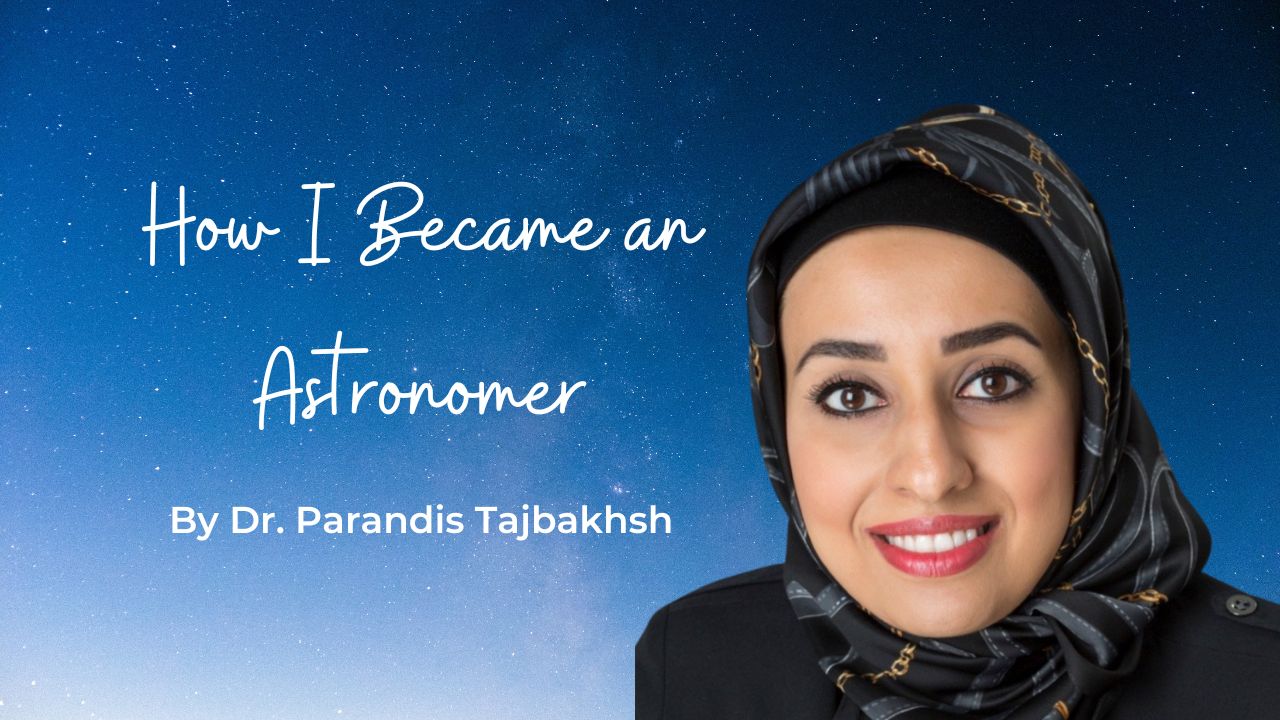By Parandis Tajbakhsh
My name is Parandis Tajbakhsh. I teach Astronomy at York University and University of Toronto Mississauga. I am a Doctor of Philosophy (Ph.D.), Astronomy and Astrophysics from University of Toronto. More than two decades ago, when I arrived in Canada from Iran, I had one big dream: to go to graduate school and start a successful career. Having studied engineering back home, I thought I had to pursue a graduate degree in engineering. The only problem was that I had no passion for engineering; I was just led to this choice by cultural pressure. Here in Canada, I thought I would direct my path to something at least more desirable by switching to computer science.
Getting into Astronomy
I went in one afternoon to discuss my prospects with the chair of Computer Science Department at the University of Toronto. He took a look at my undergraduate transcript and told me outright that I had no chance since my undergraduate marks were quite disappointing. If I were to study computer science, I had to repeat many courses to qualify for a graduate school application. I never forget that afternoon! I went into a coffee shop across the department and as I was sipping on a cup of coffee I broke into tears. Having always been a passionate student of mathematics and physics, I had ended up with a terrible record simply because I had given in to cultural pressure. I had hated every moment of the engineering school! I asked myself why I did not study physics when I could have. It was then that it occurred to me that maybe it was time for me to do what I always had wanted: to study astronomy and physics; if I were to take courses to qualify me for graduate school, why not do it in a field that I was passionate about?
It was not an easy road. I was a so-called non-degree student with no guarantee that I would be accepted into the graduate program for astronomy once I had finished all the courses that students normally took in 3 years but I was determined to make this work. Within two years I had taken all the required courses and thankfully my marks were so high that I got accepted to astronomy graduate programs both at University of Toronto and at York University. I chose University of Toronto and really loved every minute of my days there.
Graduation in History and Philosophy
I gave birth to my son, a few months before defending my Ph.D. thesis and then went on for a post-doctoral fellowship to St. Mary’s University. Here I met another challenge: it was very difficult for me to balance motherhood and research; after a few months, I decided that I wanted to spend more time with my son, so I made the difficult decision of quitting my fellowship.
As I became less preoccupied with balancing life and work, I had time to reflect upon the many discussions that I had with my doctoral advisor and my friends about science, religion and metaphysics while in graduate school. I started reading more and asking deeper questions about how science and religion interact. I felt like this question could neither be answered by scientists nor by clerics, but those who have a good understanding of both how science works and how historically religion and science interacted. So I decided to go back for a second graduate degree, this time in history and philosophy of science and this time to York University. Things were much harder this time with my son around. I was extremely sleep deprived and surviving on many cups of coffee and occasionally a can or two of Red Bull! But, I was fascinated by a whole new landscape that I had stepped into. Here, I was introduced to a very curious field that beautifully connected my background in astronomy to interaction between science and religion: the history of extraterrestrial life debate. I got hooked! I devoured the literature and was fascinated by the fact that this topic had remained rather unknown. I also noticed that there is literally no research done on how a discovery of extraterrestrial life would be seen within an Islamic perspective. I had found just the right fit for my background and interest and this field became the focus of my work.
Final Thoughts
Since then, in addition to research, I have designed courses on the topic and have given many public talks to interested audiences with a variety of backgrounds. I now teach astronomy, astrobiology and many other liberal arts courses at University of Toronto Mississauga, York University, Humber College and a few more institutions. Nothing however thrills me more than digging deeper into the history of extraterrestrial life debate. I often think about how my life could have been different if I had chosen to pursue another degree or got hired in financial sector like many other graduates of astronomy. I personally believe that loving what you do is the most important factor in life. I am so happy that I made the decision to pursue astronomy on that very sad afternoon in the coffee shop. It was the most critical step in a path that eventually led to what I love doing. If I were to repeat things again, I will definitely pursue the same path.
About the Author
Dr. Parandis Tajbakhsh is an astronomer and historian of science primarily interested in interaction between science and religion in the context of extraterrestrial life debate. She teaches at York University and University of Toronto Mississauga. She is also the Vice President of the Toronto Operetta Theatre and the author of weblog parandistajbakhsh.ca.







ABDUL KHALIQ
February 19, 2023 12:11 amASA Sister
Your story is very interesting. At the age of 67 I want to study Quantum Physics. It makes me close to ALLAH.